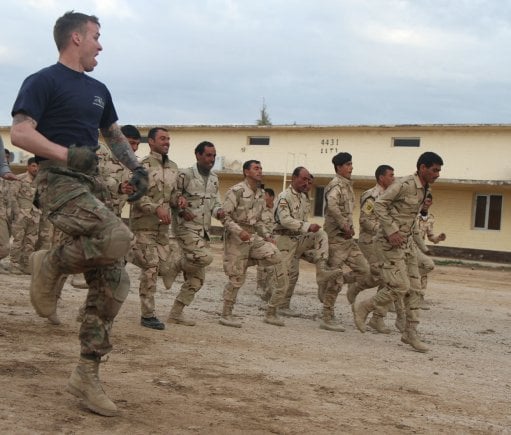Air Warfare, Congress, Land Warfare, Networks / Cyber, Threats
Sorry, President Trump: Islamic State Can’t Be ‘Quickly Defeated’

An 82nd Airborne soldier trains Iraqi troops.
WASHINGTON: Donald Trump wants “a plan for soundly and quickly defeating ISIS.” But Kimberly Kagan, a leading advocate of the troop surges in Iraq and Afghanistan, warns that, this time round, “we need to recognize there are limits on how fast we can accelerate.”
Kimberly Kagan
Part of the reason is tactical, Kagan told the DefenseOne Summit yesterday afternoon: “We actually have to respect the fact that the urban fight is a hard fight,” she said. It’s hard for Iraqi federal troops and Kurdish regional Peshmerga now clearing Mosul of Daesh (Islamic State) fighters, just as it was hard for the US to clear places like Fallujah and Sadr City. “It could perhaps be done more smoothly and easily were we, the United States, there with all our capabilities,” Kagan said, “but that’s a hypothesis.”
Part of the reason lies beyond Mosul. “There is still an ISIS threat elsewhere in Iraq,” Kagan said, not to mention in Syria, where the drive on the Islamic State capital of Raqqa is not progressing as quickly as the move on Mosul. Even once Raqqa and Mosul fall, she said, there are other urban areas Islamic State fighters could hold up, most notably the Syrian town of Deir ez-Zor, strategically located along the Euphrates river. Rather than further reinforce the drive on Mosul, she argued, the US might do well to target these second-string ISIS “bastions” so there’s nowhere for fighters retreating from Mosul to go.
Faction territories and Russian airstrikes in Syria. Note Deir ez-Zor at upper left. (Institute for the Study of War)
Part of the reason is regional. “Our objectives are rather narrowly focused on ISIS,” Kagan said, but local allies and enemies from the peshmerga to Turks to the Iranians actually have to live in the Middle East after the Islamic State is gone, and they’re already positioning themselves for the day after Daesh. We need to deter our adversaries, build up our friends, and, by the way, keep our friends from killing each other, as Turks and Kurds have done for decades.
Finally, part of the reason is global. ISIS has a global strategy, refocusing on supporters in Europe, North Africa, South Asia, and online even as its so-called caliphate collapses, Kagan said: We need a global strategy to counter theirs.
Andrew Exum
Soldier turned scholar turned Pentagon policymaker Andrew Exum agreed. Retaking Mosul and Raqqa is critical, he said, but “I don’t think any of us are under the illusion that the fight ends when… the local force with whom we’ve partnered seize those two cities.” In past urban battles, ISIS has put up a stiff fight for a while, but then fighters flee to fight another day.
That said, when ISIS fighters retreat, it’s a prime opportunity to kill them as they emerge from hiding places in populated neighborhoods and move across the open desert, Exum said. Deir ez-Zor is a long way to go from Mosul, he said, and in general, ISIS is running out of places to hide “in both Iraq and Syria.”
Would adding more US troops pick up the pace? In the short-term, sure, said Exum, but at a long-term price. “Had you put a Marine Expeditionary Unit on the ground and told them to seize Raqqa, they would have seized Raqqa by now,” he said. But then who would have held Raqqa, or Mosul, or Deir Ez-Zor, after the US troops withdrew? As we’ve learned, painfully, in both Afghanistan and Iraq, the US can drive out an enemy, but unless there are friendly local forces with the military power and political will to fill the vacuum, the whole thing will collapse again.
Lisa Monaco
“The way we’re doing this through local forces takes more time,” Exum said, “(but) the risk… is more than outweighed by the sustainability.”
Even when strong local allies holding the ground, however, the war against the Islamic State won’t end, just mutate. While there will no longer be a quasi-government holding territory and fighting from fixed positions, the terror cells and online sympathizers will remain.
“What has distinguished ISIL has been that it has operated as a hybrid threat – an insurgent army, a terror group, (and) a social phenomenon using social media,” said Lisa Monaco, assistant to the president for counterterrorism. “On all three dimensions, I believe ISIL is absolutely losing.”
But defeating them requires a complex global coalition ranging from Syrian rebels to US special operators to the management of Twitter and Facebook. Twitter is taking down “a thousand accounts a day” for suspected links to terrorist recruiting, Moncao told the DefenseOne conference, while Google is redirecting suspected ISIS sympathizers’ web searches away from terrorist propaganda.
Michael Lumpkin
The US government is propagating online counter-propaganda of its own as well, said Michael Lumpkin, the ex-Navy SEAL who now heads the State Department’s Global Engagement Center. “We’ve seen almost a 400 percent increase in funding towards this effort over the past two years,” he told the conference. The social media effort uses things like Facebook analytics to identify populations susceptible to ISIS recruiting — though privacy law limits the use of big data, Lumpkin lamented — and then target them with customized messages.
The actual online spokesperson is often foreign, not American, with the US in the background as advisors — a way in which the global campaign online is like the physical battlefield in Iraq and Syria. “While we may have a really, really good message, we’re not always the most credible messenger to deliver it,” said Lumpkin.
“We’re not going to kill our way to victory. It’s just not going to happen,” Lumpkin said. “But that said, we’re not going to message our way to victory either. This is truly a layered approach” — and that takes time.